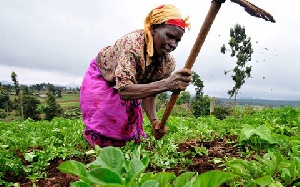 The programme, according to government, will motivate farmers to grow staple foods
The programme, according to government, will motivate farmers to grow staple foods
Government’s Planting for Food and Jobs programme has come under scrutiny by industry players a day after it was launched in the Brong Ahafo Region.
President Nana Akufo-Addo during the launch of the programme on Wednesday 19 April said about 750,000 jobs would be created, adding that government would construct one warehouse in all 216 districts across the country to support the programme.
The programme, according to government, will also motivate farmers to grow staple foods such as maize, millet and beans, but the General Secretary of the General Agricultural Workers Union (GAWU), Edward Karawe, told Class News the farming season across the country varies hence it would be better to carefully plan the programme.
“They are saying that they are going to build a 1000 metric tonne-capacity warehouse. That is OK, but I’m only trying to explain that these are sorghums, rice and maize and they cannot easily be put together. But if we have a complex warehouse where you have designed it in such a way that you can store all of them without necessarily creating storage problems, that’s fine. Otherwise, there is bound to be a challenge in that.
Also, when are the warehouses coming and how long should we wait? Even the gestation period for the rice and maize production is between three to four months, so if they are saying that by four months’ time the warehouses should be ready in all the regions, then that’s OK. Otherwise there will be a gap so we are only raising these issues so they address those gaps,” he stated.
Meanwhile, a former vice chair of the parliamentary select committee on agriculture, Bright Demordzi, has said the Planting for Food and Jobs programme is not well thought out.
“We are saying this because the programme has been launched and the season for the southern zone starts by 16 April and in agriculture, we have the controllable factor and uncontrollable factor, so for any project that will be effectively managed and…objectives achieved, you need to minimise the uncontrollable and even take full control of the controllable. But we have seen that so far even the controllable are not being taken care of, even before the uncontrollable,” he told Nabil Ahmed Rufai on 12 Live.
“With the controllable, we are talking about the seeds to be distributed to the farmers, fertilisers and even the extension agents who are supposed to serve as experts to guide the farmers, but there is also a difficulty there. As it stands now, today, can we be assured that all the seeds are in this country? Are we going to import [them]?
If we are importing where are we going to import [them] from? Does the various districts have the seeds in place? “Fertilizer importation and distribution [are] done by the private sector in Ghana. Does the private sector have the capacity now to ensure that there is efficient distribution of fertiliser to the number of farmers they claim they have registered? Ordinarily, the answer is no.”